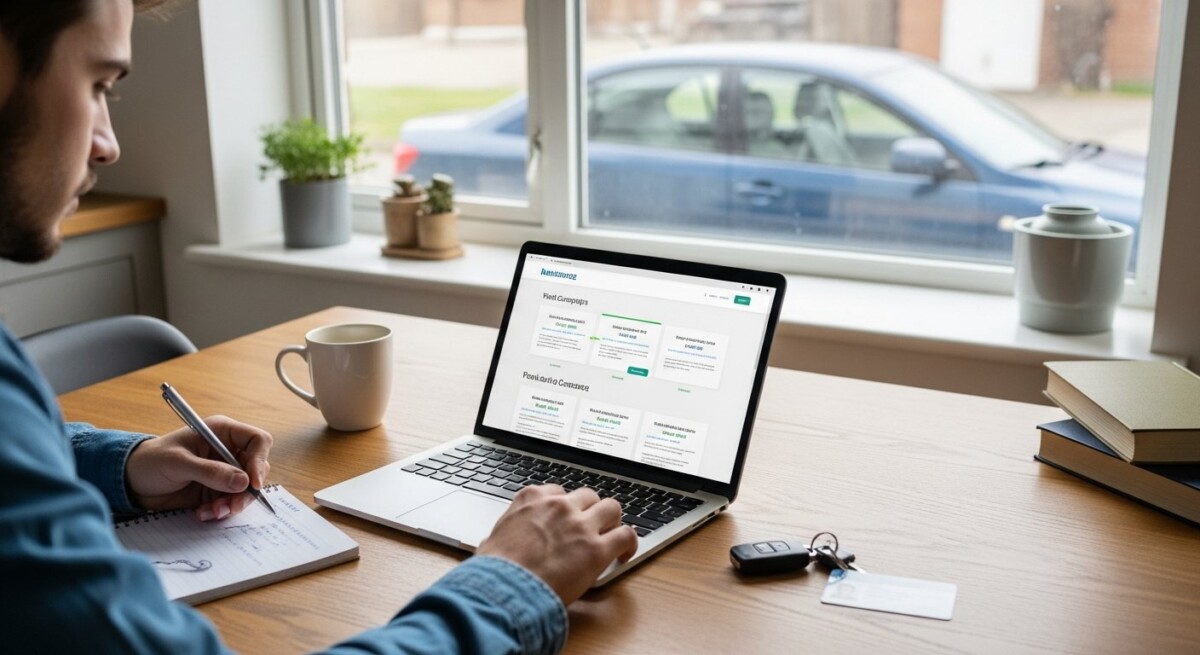
Understanding the Impact of Accidents on Your Insurance Rates
Accidents happen, and when they do, they can significantly affect your insurance rates. The immediate aftermath of an accident can be overwhelming, but understanding how to lower insurance after an accident can help you regain control.
The problem is that insurance companies often view accidents as indicators of risk, leading to increased premiums.
The promise is that by taking strategic steps, you can mitigate these increases and potentially lower your insurance costs over time.
Why Do Insurance Rates Increase After an Accident?
Insurance companies adjust rates based on perceived risk. After an accident, they may see you as a higher risk, leading to increased premiums. However, not all hope is lost. By understanding the factors that influence these rate changes, you can take proactive steps to manage your costs.
- Severity of the Accident: Minor accidents might not impact your rates as much as major ones.
- Fault Determination: If you’re not at fault, your rates might not increase significantly.
- Claim History: Frequent claims can lead to higher rates.
Steps to Lower Insurance After an Accident
- Consider Accident Forgiveness: Some insurers offer accident forgiveness programs that prevent your rates from increasing after your first accident.
- Shop Around: Different insurers assess risk differently. Comparing quotes can help you find a better rate.
- Increase Your Deductible: A higher deductible can lower your premium, but ensure it’s an amount you can afford.
- Take a Defensive Driving Course: Completing a course can demonstrate responsibility and potentially lower your rates.
By understanding these factors and taking action, you can effectively manage your insurance costs after an accident. Remember, the key is to stay informed and proactive in your approach.
What Steps Can You Take Immediately After an Accident to Lower Insurance Costs?
Accidents can be overwhelming, but knowing how to lower insurance after an accident can ease the financial burden. The problem many face is the potential increase in insurance premiums following an incident. However, by taking immediate and strategic steps, you can mitigate these costs and maintain a manageable insurance rate.
Document Everything Thoroughly
- Gather Evidence: Take photos of the accident scene, vehicle damage, and any visible injuries. This documentation can be crucial in disputes and claims.
- Exchange Information: Collect contact and insurance details from all parties involved. This ensures clear communication and accurate reporting.
Report the Accident Promptly
- Contact Your Insurer: Notify your insurance company as soon as possible. Prompt reporting can prevent misunderstandings and demonstrate responsibility.
- File a Police Report: Even for minor accidents, a police report can provide an official account, which is valuable for insurance claims.
Consider a Defensive Driving Course
Taking a defensive driving course can sometimes lead to discounts on your insurance premium. It shows your commitment to safe driving and can offset the impact of an accident on your record. Check with your insurer to see if they offer such discounts. By following these steps, you can effectively manage how to lower insurance after an accident, keeping your premiums in check while navigating the aftermath of an accident.
How to Communicate Effectively with Your Insurance Provider
Accidents can be stressful, and dealing with insurance providers afterward might seem daunting. However, effective communication can significantly impact how to lower insurance after an accident. By understanding the right strategies, you can navigate this process smoothly and potentially reduce your premiums.
Understand Your Policy
- Review Coverage Details: Before contacting your provider, thoroughly review your policy to understand your coverage limits and any potential penalties.
- Identify Key Terms: Familiarize yourself with insurance jargon to communicate more effectively and avoid misunderstandings.
Be Prepared and Organized
- Gather Necessary Documents: Have all relevant documents, such as the accident report and repair estimates, ready before your call.
- Keep Records: Document all communications with your provider, including dates, times, and the names of representatives you speak with.
Communicate Clearly and Calmly
- State Facts Clearly: When discussing the accident, stick to the facts and avoid unnecessary details.
- Ask Questions: Don’t hesitate to ask for clarification on any terms or processes you don’t understand.
By following these steps, you can enhance your communication with your insurance provider, making it easier to discuss how to lower insurance after an accident. Remember, staying informed and organized is key to achieving the best possible outcome.

Searching for affordable auto insurance? Head over to FreeAutoInsuranceQuotes to compare quotes and save on your policy! Have questions? Call us at 833-211-3817 for immediate assistance!
Exploring Discounts and Benefits: How to Lower Insurance After Accident
Accidents can be stressful, not just emotionally but financially, as insurance premiums often rise. However, there are strategic ways to mitigate these costs and keep your insurance affordable. By exploring available discounts and benefits, you can effectively learn how to lower insurance after an accident and ease the financial burden.
Understand Available Discounts
One of the first steps in reducing your insurance costs is to understand the discounts available to you. Many insurance companies offer a variety of discounts that can help offset the increase in premiums after an accident:
- Safe Driver Discounts: If you have a history of safe driving, you might still qualify for a discount despite a recent accident.
- Bundling Policies: Consider bundling your auto insurance with other policies like home or life insurance to receive a multi-policy discount.
- Loyalty Discounts: Long-term customers may be eligible for loyalty discounts, so it’s worth discussing this with your provider.
Leverage Accident Forgiveness Programs
Many insurance companies offer accident forgiveness programs, which can be a lifesaver if you’ve recently been in an accident. These programs prevent your rates from increasing after your first accident, maintaining your premium at its current rate. Check with your insurer to see if you’re eligible for such a program, as it can significantly impact how to lower insurance after an accident.
Improve Your Driving Record
Improving your driving record is another effective way to lower your insurance premiums over time. Consider taking a defensive driving course, which not only enhances your driving skills but can also lead to discounts on your insurance. Additionally, maintaining a clean driving record post-accident will gradually help reduce your premiums as insurers reassess your risk profile.
The Role of Defensive Driving Courses in Reducing Insurance Premiums
Accidents happen, and when they do, insurance premiums often skyrocket, leaving many wondering how to lower insurance after an accident. The good news is, there’s a proactive step you can take: enrolling in a defensive driving course. These courses not only enhance your driving skills but also demonstrate to insurance companies that you’re committed to safer driving, potentially leading to reduced premiums.
Benefits of Defensive Driving Courses
- Skill Enhancement: Defensive driving courses teach advanced techniques to anticipate and avoid potential hazards on the road, making you a safer driver.
- Insurance Discounts: Many insurers offer discounts to drivers who complete these courses, which can significantly lower your insurance premiums after an accident.
- Confidence Boost: By improving your driving skills, these courses can also boost your confidence, reducing the likelihood of future accidents.
How to Enroll in a Course
- Research Options: Look for accredited defensive driving courses online or in your local area.
- Check with Your Insurer: Confirm with your insurance provider which courses qualify for discounts.
- Complete the Course: Dedicate time to complete the course and obtain your certificate.
By taking a defensive driving course, you not only learn how to lower insurance after an accident but also gain valuable skills that contribute to safer driving habits. This proactive approach can lead to long-term savings and peace of mind on the road.
Can Repairing Your Vehicle Quickly Help Lower Insurance Rates?
Accidents happen, and when they do, your insurance rates can take a hit. But what if there was a way to mitigate this impact?
How to lower insurance after accident is a question many drivers face. One promising approach is to repair your vehicle quickly after an accident. This proactive step not only restores your car but can also positively influence your insurance rates.
Why Quick Repairs Matter
- Demonstrates Responsibility: Promptly repairing your vehicle shows insurers that you are a responsible driver who takes immediate action to rectify issues.
- Prevents Further Damage: Addressing damages quickly can prevent them from worsening, which might lead to more expensive claims.
Communicate with Your Insurer
- Report Promptly: Inform your insurance company about the accident and your repair plans as soon as possible.
- Provide Documentation: Keep detailed records of repairs and costs to support your case for maintaining or lowering your rates.
Taking swift action after an accident can be a strategic move in managing your insurance costs. By repairing your vehicle quickly, you not only ensure your safety on the road but also demonstrate to your insurer that you are committed to maintaining your vehicle in top condition. This can be a key factor in how to lower insurance after accident, potentially keeping your premiums in check.
How to Leverage a Clean Driving Record to Offset Accident Costs
Accidents happen, and when they do, your insurance rates can skyrocket. But don’t worry—there are ways to mitigate these costs. By leveraging a clean driving record, you can learn how to lower insurance after an accident effectively. This strategy not only helps in reducing premiums but also ensures long-term savings.
Maintain a Clean Driving Record
- Drive Safely: Avoid further incidents by adhering to traffic rules and regulations.
- Take Defensive Driving Courses: These courses can sometimes lead to discounts on your insurance.
A clean driving record is your best asset. It shows insurers that the accident was an anomaly, not a pattern. By maintaining this record, you demonstrate responsibility, which can lead to lower premiums over time.
Communicate with Your Insurer
- Discuss Your Record: Highlight your clean history when negotiating rates.
- Ask for Discounts: Inquire about any available discounts for safe drivers.
Open communication with your insurer can reveal opportunities for discounts. By emphasizing your clean driving record, you can negotiate better terms and potentially lower your insurance costs post-accident.
The Importance of Shopping Around: Comparing Insurance Quotes Post-Accident
Getting into an accident can be stressful, and the aftermath often includes increased insurance premiums. But don’t worry—there are ways to manage this. One effective strategy on how to lower insurance after accident is to shop around for better rates. By comparing quotes from different insurers, you can find a policy that suits your needs and budget, potentially saving you a significant amount of money.
Why Compare Insurance Quotes?
- Variety of Options: Different insurers offer varying rates and coverage options. By exploring multiple quotes, you can identify the best deal.
- Tailored Policies: Some insurers may offer discounts or tailored policies for drivers with recent accidents, helping you lower your insurance costs.
Steps to Compare Effectively
- Gather Information: Collect details about your current policy, accident history, and any changes in your driving habits.
- Use Online Tools: Leverage comparison websites to quickly view multiple quotes side-by-side.
- Consult an Agent: Sometimes, speaking directly with an insurance agent can reveal discounts or options not available online.
Shopping around is crucial in finding the best insurance rates post-accident. By taking the time to compare, you can ensure you’re not overpaying and that your coverage meets your current needs. This proactive approach not only helps in how to lower insurance after accident but also empowers you to make informed financial decisions.
How to Utilize FreeAutoInsurance for Tailored Insurance Solutions After an Accident
Accidents can be stressful, and the aftermath often leaves many wondering how to lower insurance after an accident. The good news is that FreeAutoInsurance offers tailored solutions to help you navigate this challenging time. By leveraging their comprehensive resources, you can find insurance options that suit your specific needs and potentially reduce your premiums. Let’s explore how you can make the most of these offerings.
Understand Your Current Policy
Before making any changes, it’s crucial to understand your existing insurance policy. Review your coverage details and identify areas where adjustments can be made. This knowledge will empower you to make informed decisions when seeking new quotes or negotiating with your current provider.
Explore Customized Insurance Quotes
FreeAutoInsurance provides access to a wide range of insurance providers, allowing you to compare customized quotes. This comparison can highlight more affordable options and help you find a policy that better fits your post-accident circumstances. By taking advantage of these tailored solutions, you can effectively lower your insurance costs.
- Compare Multiple Quotes: Use the platform to gather and compare quotes from various insurers.
- Look for Discounts: Check for any available discounts that could apply to your situation.
Implement Safe Driving Practices
Another way to lower insurance after an accident is by demonstrating safe driving habits. Many insurers offer discounts for drivers who maintain a clean record post-accident. FreeAutoInsurance can guide you to insurers that reward safe driving, helping you further reduce your premiums over time.
What Are the Long-Term Strategies for Maintaining Lower Insurance Rates?
Accidents happen, and when they do, your insurance rates can skyrocket. But don’t worry—there are ways to manage and even lower your insurance rates over time. By adopting strategic habits and making informed decisions, you can keep your premiums in check and enjoy more affordable coverage. Let’s explore some effective long-term strategies for maintaining lower insurance rates after an accident.
Consistently Maintain a Clean Driving Record
One of the most effective ways to lower insurance after an accident is to maintain a clean driving record. Insurance companies reward safe drivers with lower premiums. Avoid traffic violations and accidents by practicing defensive driving and staying alert on the road. Over time, your improved record can lead to reduced rates.
Regularly Review and Update Your Policy
Insurance needs change, and so do the policies. Regularly reviewing your insurance policy ensures that you have the right coverage at the best price. Consider adjusting your deductible or dropping unnecessary coverage to save money. This proactive approach can help you identify savings opportunities and keep your rates competitive.
Take Advantage of Discounts
Many insurance companies offer discounts that can help lower your premiums. These may include discounts for bundling policies, installing safety features in your vehicle, or even for being a loyal customer. Ask your insurer about available discounts and take full advantage of them to reduce your insurance costs.
By implementing these strategies, you can effectively manage your insurance rates and enjoy long-term savings. Remember, the key is to stay informed and proactive about your insurance needs.
Take the next step toward affordable coverage. Visit FreeAutoInsuranceQuotes and get instant quotes that fit your budget and driving needs. If you’d like to speak with a representative, call us at 833-211-3817!
Explore NewAutoInsurance to find a wide range of insurance options tailored to your needs


